What's in a name? Bar(e) does not only mean 'cocktail bar' in Danish, but also 'only', and djus is a misspelling of 'juice' except in the Faroe Islands. This autonomous archipelago within the Kingdom of Denmark, but not part of the European Union, is the first export market for BAR DJUS's freshly squeezed juice.
A unique name, then. Even more remarkable is the company's genesis. And for that, we don't have to go that far back in time. It was the year 2016. Daniel Pontopiddan Szylit, BAR DJUS's CEO, was working in a bank. His client portfolio consisted of corporations. Sounds nice, but he hated his job. He was tired of having to turn down people, shattering their dreams, he says.
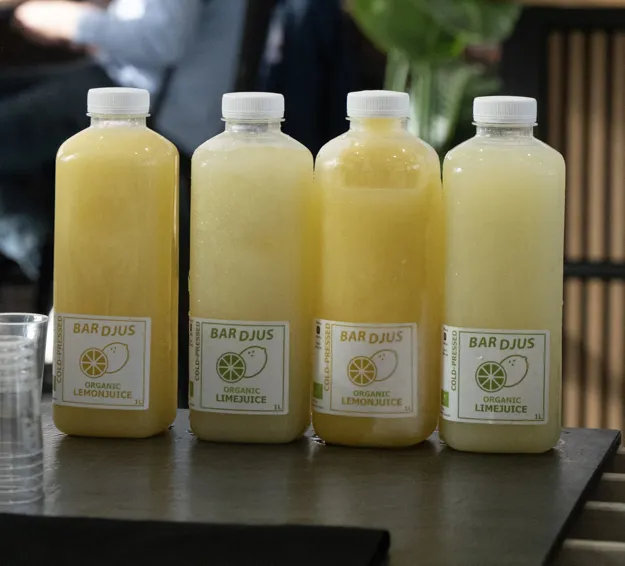
The bank was apparently fed up with Daniel, too, and on the day they fired him, he bought a 'juice bike'. He began selling fruit and vegetable juice to people on the streets of Copenhagen. And to avoid encountering dreary faces, he decided he wanted to make his new customers laugh. He thus named his concept 'Juice and Jokes': You have to pay for your cup of freshly squeezed juice, but the joke is free.
But the point from selling a cup of juice and a joke to supplying cold-pressed lime, lemon, and ginger juice to cocktail bars, wholesalers, and the food service industry in Denmark, Sweden, Norway, Iceland and the Faroe Islands was still a way off. Daniel's next step was delivering freshly squeezed juice to the Cash & Carry, a hospitality industry supermarket, so to speak, where he bought the apples, carrots, and ginger for his street drinks. That supermarket's management became curious.
Why did this man purchase the same kind of fruits and vegetables every day? What was he doing with it? Once they found out, they suggested Daniel become their exclusive freshly squeezed juice supplier, to which he agreed. On weekdays he received the order at 2 p.m., with delivery due at 6 a.m. the next day. Daniel met that deadline every single time, even though he did not have a workshop or even a juicer. On weekends, Daniel still supplied juice - and jokes - from his bicycle.
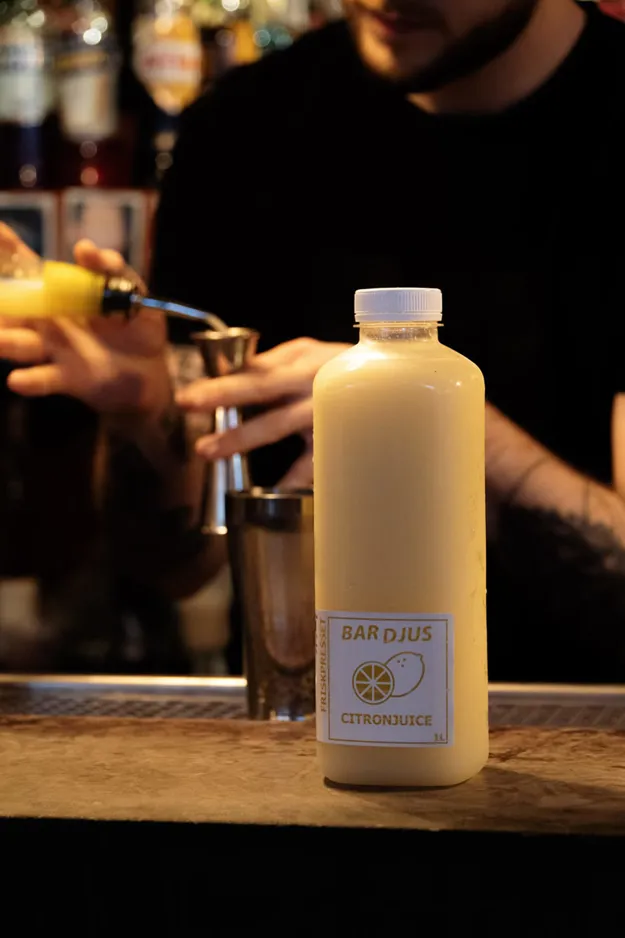
Food service companies slowly started ordering juice directly from him. Those sales were not substantial for the first four years, especially when the pandemic hit. "I tried to, unsuccessfully, gain a foothold in supermarkets. Meanwhile, I was almost exclusively supplying one-liter bottles of both organic and conventional lime, lemon, and ginger to food service businesses - some 300,000 liters a year, 80% of which was lime and lemon juice," begins the CEO.
To import raw materials, BAR DJUS uses Danish importers. Most of its limes come from Brazil, lemons from Sicily, and ginger from Peru. "We couldn't source ginger from Peru for a while because of the political unrest there, so we switched to Brazil. But I didn't like how those tasted." Pricing for imports is usually done monthly; customers, too, are given a monthly or three-month price quote.
"I'd prefer buying European limes; it's more sustainable. But it's too expensive and the season's too short. They don't taste the same, either. We can keep the limes refrigerated for about a month because they have already been in transit and storage in the Netherlands for many weeks. We buy slightly damaged limes, deemed unsuitable for the supermarket. To shorten the chain, we'd contacted Brazilian exporters to buy the Class II fruit directly from them, but then we'd have to buy sizes unsuitable for our machines," says Daniel.
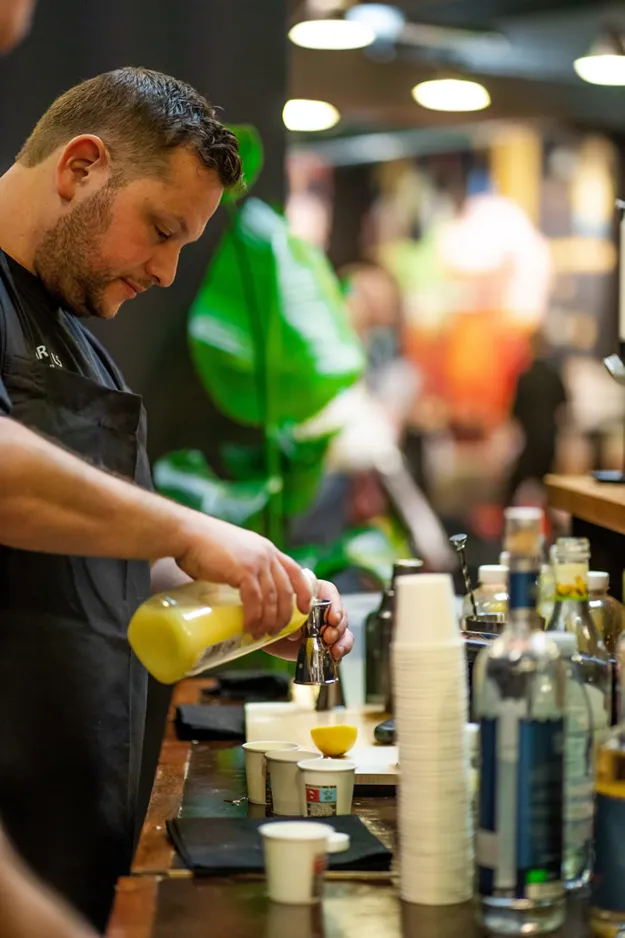
The Primofiori lemons he uses come in 10kg boxes from a farm in Catania. For now, BAR DJUS' facilities are too small to accommodate crates or big bags. That lack of space is also why Daniel does not want to expand the juice range to include other fruits. "Then you need other machines, and we don't have the space. Buying the juice itself isn't an option either. Everything we've tasted so far doesn't come close to our quality." BAR DJUS uses the most natural method, cold-pressing, whereas the competition prefers high-pressure processing (HPP), in which juices are bottled under high pressure, killing off microorganisms and boosting shelf life.
Daniel plans to, in time, open production facilities in Italy and Brazil. "That would save on transportation costs and manual labor, but poses other challenges. In another country, you rely on being surrounded by the correct employees and suppliers, which isn't always a given. Here in Denmark, finding workers is easier, but good ones are scarce. However, we've managed to put together a quality team, all over-40s, and Danes. That's not common in our industry," Daniel explains.
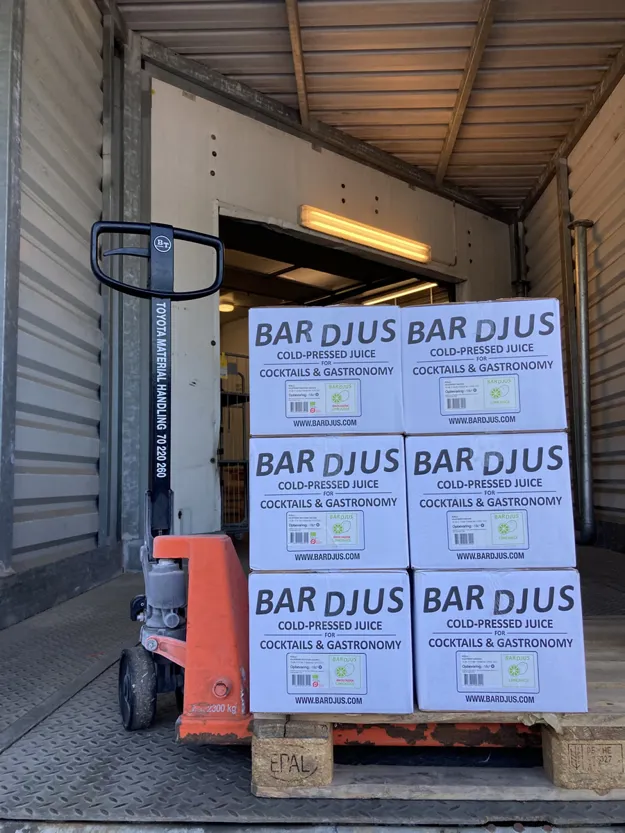
The fruit's flavor quality differs throughout the year, so he decided to make the best use of peak times by revving up juice production during those good times and freezing the excess production. "I got the idea when I supplied juice for a huge Danish musical festival held in July. Besides fruit's high prices in the summer, availability and quality can also be an issue, especially for organic products, like the organizers wanted.”
“They were delighted with the end product, but optimizing the freezing process to match freshly-squeezed juice's quality took me a long time. The frozen juice lasts a year. You often see such products in supermarkets in South America, where I got the inspiration in Chile. Now I also supply this product to ice cream and lemonade makers," Daniel adds.
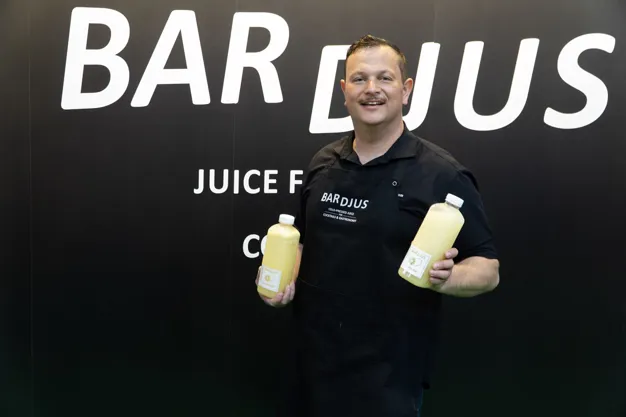
He is not adding other fruits, but that does not mean the business is not growing. "On the contrary, it's expanding increasingly rapidly. We've only just started in the Swedish market, but it's grown to double the size of the Danish one. So, with just lime and lemon, we can double our sales. And we plan to add two countries to our customer base this year. Food service, not retail, is our best market. I love working with chefs and bartenders, or gastro nerds, as I like calling them."
Daniel also supplies a few chefs with fruit peels. "Particularly bergamot and yuzu. The peels go to people who want to make limoncello and other liqueurs or even to Carlsberg. The remaining residual waste is feedstock for biogas, so there's zero waste. The latter option, though easiest, is not my preference. I love the magic chefs perform with these peels. In the future, we thus want all our residual waste to be used for food production," he concludes.
For more information:
BARDJUS
Daniel Pontopiddan Szylit (CEO)
4 Rundageren
2640, Hedehusene, Denmark
Tel: +45 611 01 621
Email: bardjus@bardjus.com
Website: www.bardjus.com
